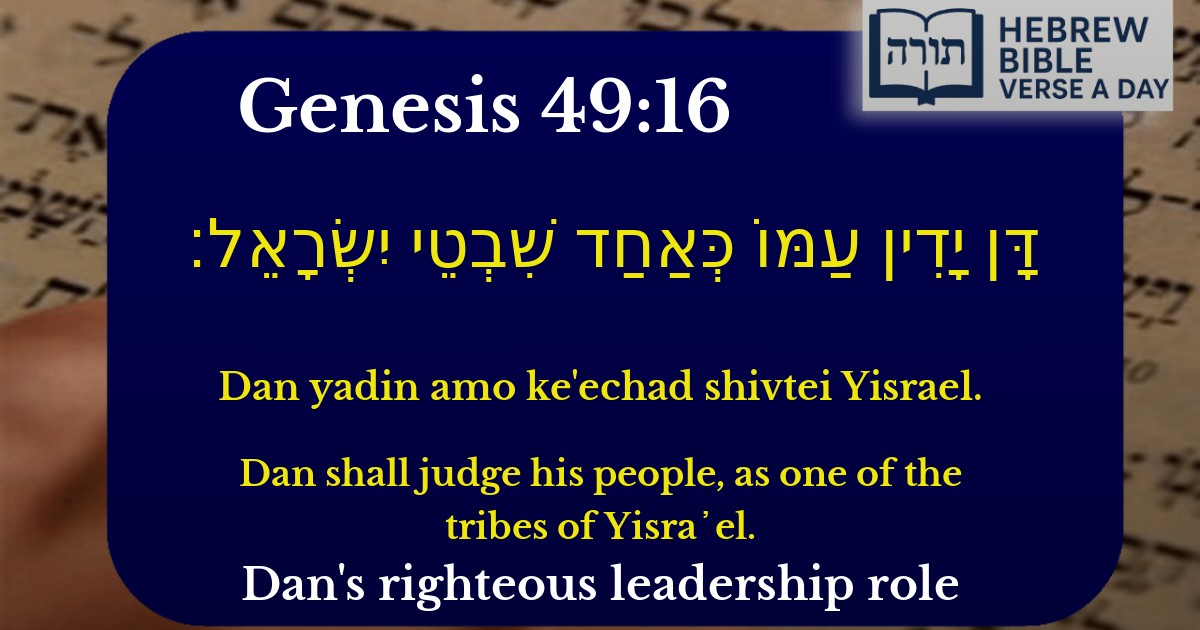Join Our Newsletter To Be Informed When New Videos Are Posted
Join the thousands of fellow Studends who rely on our videos to learn how to read the bible in Hebrew for free!
Hebrew Text
דָּן יָדִין עַמּוֹ כְּאַחַד שִׁבְטֵי יִשְׂרָאֵל׃
English Translation
Dan shall judge his people, as one of the tribes of Yisra᾽el.
Transliteration
Dan yadin amo ke'echad shivtei Yisrael.
Hebrew Leining Text
דָּ֖ן יָדִ֣ין עַמּ֑וֹ כְּאַחַ֖ד שִׁבְטֵ֥י יִשְׂרָאֵֽל׃
דָּ֖ן יָדִ֣ין עַמּ֑וֹ כְּאַחַ֖ד שִׁבְטֵ֥י יִשְׂרָאֵֽל׃
🎵 Listen to leining
Parasha Commentary
📚 Talmud Citations
This verse is not quoted in the Talmud.


Context in Yaakov's Blessing
The verse "Dan shall judge his people, as one of the tribes of Yisra᾽el" (Bereishit 49:16) appears in Yaakov Avinu's prophetic blessings to his sons before his passing. Rashi explains that this refers to the tribe of Dan producing judges who would lead and deliver Bnei Yisrael, particularly Shimshon (Samson), who arose from Dan.
Dan's Role as a Judge
Ramban (Nachmanides) elaborates that Dan's judicial role was unique—unlike other tribes whose leadership was tied to kingship or priesthood, Dan's distinction was through mishpat (justice). The phrase "as one of the tribes of Yisra᾽el" implies equality; though Dan was born from Bilhah (a maidservant), his tribe’s role was no less significant than those born from Leah or Rachel.
Shimshon as Fulfillment
The Midrash (Bereishit Rabbah 98:14) connects this verse to Shimshon, who judged Israel for 20 years (Shoftim 16:31). Despite his personal flaws, Shimshon’s strength and leadership against the Pelishtim (Philistines) exemplified Dan’s mission. The Talmud (Sotah 10a) notes that Shimshon’s name reflects shemesh (sun), symbolizing his radiant role in delivering justice.
Symbolism of the Serpent
Yaakov later compares Dan to a nachash (serpent) (Bereishit 49:17). The Kli Yakar explains this duality: a judge must be wise like a serpent (strategic) yet righteous, striking only when necessary. The tribe of Dan thus embodied both justice and vigilance.
Legacy in the Wilderness
In Bamidbar (2:25), Dan’s camp traveled last during the Israelites’ journeys. The Ohr HaChaim suggests this positioned Dan as a "judge" protecting the rear—ensuring no stragglers were left behind, further fulfilling their tribal destiny.